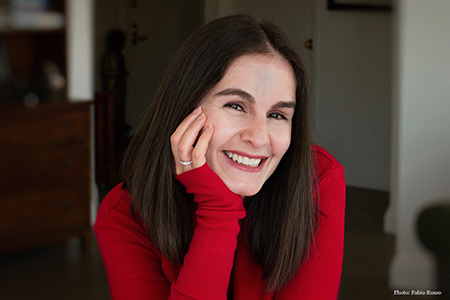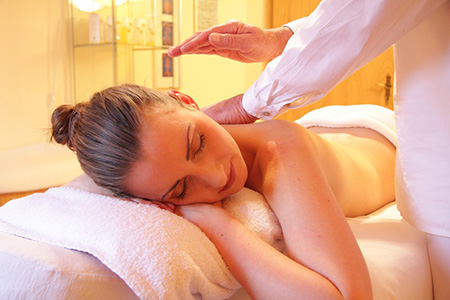Health + Medicine
The Joy of Mothering—Yourself

Although my bubbe was fluent in multiple languages—Yiddish, Polish, German and English—she still would have had a hard time translating the phrase “self-care.” Who had time to care for oneself in the midst of fleeing Poland? She endured the war years in a Siberian work camp and then temporarily settled into a displaced persons camp in Germany. There, my bubbe gave birth to her first daughter, the baby who would become my mother.
Bubbe never knew from mothercare, let alone Mother’s Day, which this year comes on May 13.
Though she is deceased, my grandmother, like most of her generation, I imagine, would have liked nothing more than to know that her granddaughter’s experience of birth was entirely dissimilar to her own. Far from the difficulties of laboring in a makeshift hospital erected in a war-torn land, I had my baby in 2009 in an upscale birthing center whose furnishings approximated those in a well-appointed Hilton hotel room. Unlike my bubbe, I had all the comforts of home—I had a home.
And yet, some 70 years later, even with the surplus of resources at my disposal, my foray into motherhood was something of a “failure to thrive.” This term usually refers to infants whose growth is stunted by a lack of nourishment; as a new mom, I suffered from not knowing how to feed myself.
Motherhood, for all its privilege, crashed down on me like a tidal wave. The cultural pressure to breastfeed, manage sleep deprivation, co-parent and return to my job seamlessly was overwhelming. Only in retrospect did I understand that my stunted maternal development was the result of a failure to nourish myself. And I was not alone. Personal and professional experience dictate that my generation of mothers, the Gen-X’ers, and the millennials just behind me are feeling overworked and under-well. Our bubbes may not have had the opportunity to attend to their needs during this most profound of transitions, but we do. And we must.
Rabbi Aron Moss, of Chabad’s Nefesh synagogue in Sydney, Australia, made a compelling argument on the Arutz Sheva website some years ago that, as Jews, we have an obligation to care for ourselves. The reason Jewishness is passed down through the maternal line “is not simply because it is easier to identify who your mother is,” he writes. “Jewishness is passed down by the mother because being Jewish is a spiritual identity, it defines our very being. And our very being we get from our mother, both in body and in soul.” How can we possibly infuse our children with a healthy, happy being, if we do not cultivate one in ourselves?
While children do not come with a manual, a guidebook for moms on how to manage the most common challenges in the early years of parenting is entirely feasible. When I began to explore research-based interventions, I discovered a wide range of practical supports that may be easily incorporated into daily life. Doing so can have lasting, positive implications for both mothers and their children.
 Here are three of my favorite supports. The first is food (of which my bubbe, who later owned a luncheonette, would most definitely have approved). Certain foods, for example, enable blood sugar levels to remain high throughout the day, in turn reducing fatigue and raising energy levels. These foods are rich in complex carbohydrates. So, choose brown rice over white, and multigrain pasta over the traditional paler variety. Including some protein is another great way to help feel sated and keep blood sugar levels on an even keel. A modest smear of nut butter (almond butter is my fave) on a piece of whole grain toast or brown rice cake makes for a satisfying mid-morning snack. Wash it down with a tall glass of water, too. Hydration can stave off constipation (another culprit of fatigue).
Here are three of my favorite supports. The first is food (of which my bubbe, who later owned a luncheonette, would most definitely have approved). Certain foods, for example, enable blood sugar levels to remain high throughout the day, in turn reducing fatigue and raising energy levels. These foods are rich in complex carbohydrates. So, choose brown rice over white, and multigrain pasta over the traditional paler variety. Including some protein is another great way to help feel sated and keep blood sugar levels on an even keel. A modest smear of nut butter (almond butter is my fave) on a piece of whole grain toast or brown rice cake makes for a satisfying mid-morning snack. Wash it down with a tall glass of water, too. Hydration can stave off constipation (another culprit of fatigue).
The second is acupressure. Developed 5,000 years ago, acupressure is essentially a form of massage. Studies have proven its efficacy in easing a range of challenges: Stress relief and enhanced feelings of calm can all be promoted by treating particular acupressure points on the body. I would have welcomed the knowledge that a series of points called “Pericardium 5, 6 and 7” (on the inside of the wrists) are known to reduce feelings of anxiety—useful whether your baby is leaving the hospital or leaving for college.
And finally: “flexercise.” No, it’s not exercise. It’s my own novel approach to integrating movement and motherhood. The flexercise philosophy incorporates a number of tenets, namely that working out should:
• make you feel better, not worse;
• fit comfortably into your daily (or nightly) routine;
• be adaptable to your current level of fitness; and
• embrace the reality that sometimes rest is more important than motion.
If your interest is piqued, then test out this flexercise routine: Lace-up your sneakers and head out for a brisk 30-minute walk. Walking bolsters endorphin levels (enhancing your mood), can be done almost anytime and anywhere (easy to schedule), offers variations in speed (to accommodate your energy level and overall fitness) and is easy to stop (when it’s time to rest). You can also check out Hadassah’s Heart Health Program Every Beat Counts to learn more about how you can empower yourself and other women to live healthier and happier—from learning to eat well (especially colorful fruits and vegetables, and limiting sugar-sweetened beverages) to taking 10,000 steps daily.
May this Mother’s Day be the beginning of making mothercare a part of your life. Your bubbe will be filled with naches.
Dayna M. Kurtz, L.M.S.W., C.P.T., is the author of the recently released Mother Matters: A Holistic Guide to Being a Happy, Healthy Mom (Familius Press) and serves as the director of the Anna Keefe Women’s Center at the Training Institute for Mental Health in Manhattan.










 Facebook
Facebook Instagram
Instagram Twitter
Twitter
Leave a Reply